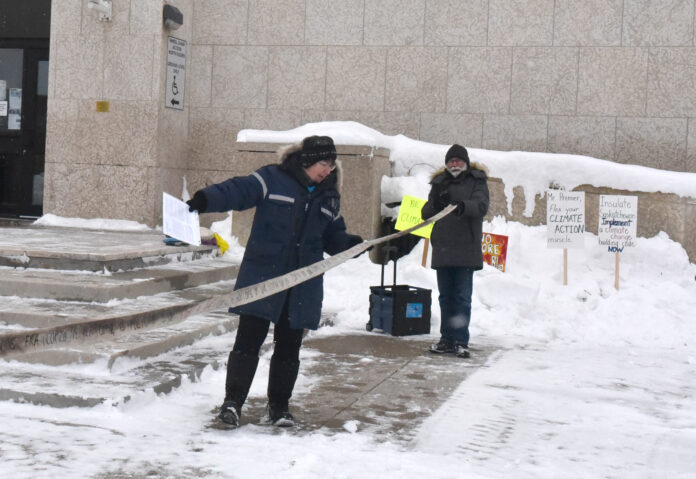
A core group of people wanting to push the province into taking steps to reduce carbon emissions walked to City Hall from the EA Rawlinson Centre on Nov. 12.
The group included Rick Closs, a member of Renewable Power – the Intelligent Choice (RPIC) who said they timed the march to coincide with the end of COP21, the United Nations led Climate Change Conference in Scotland.
“We’ve had two weeks of a lot of talk in Glasgow, and some of its been good and some of it not so good,” Closs said. “But I think we can say, especially coming from Canada, that we’ve always been good at talking and not so good at meeting our targets.
“Right now, we’re in the tail end of COP26 and so we’ve seen some action and some inaction. And a lot of blah, blah, blah. “
As an activist, Closs is tired of limited action from governments. He hopes that making emissions reduction a priority amongst the public will help change government’s minds.
“The goal is raise awareness amongst the public. We’d like to say we could influence government, but that really is next to impossible,” said Closs of the decision to hold the walk.
He points out that Canada is now two per cent below the emissions target set in 2005, and added that governments are not doing enough fast enough.
Canada ranks 11th in the world in CO2 emissions with 0.53GT annually, according to the Union of Concerned Scientists, a US based organization. China is the leading emitter at 10.05GT while the US ranks second with 5.41GT.
In per capita rankings, Canada is the fifth highest emitter at 15.32T and Saudi Arabia is first at 18.48T.
Closs says that people need to change their perspective from seeing Canada as an isolated country and view their own spot as it impacts the rest of the world.
“We always have to keep thinking we’re not just citizens of Canada. We’re citizens of Planet Earth. When we talk about protecting our economies, I understand that but we also have to think about the impact we’re having globally. CO2 has no boundaries,” he said.
He would like the province to take several steps, such as upping the target of 45 per cent reduction in vented methane gas that it committed to in the next two years and also commit to a 75 per cent reduction by 2030.
Another step is what he referred to as Insulate Saskatchewan, a proposal to help owners of older home upgrade their insulation.
This step should be as part of an updated building code and could have the added spinoff benefit of job creation.
“We should start with the oldest houses and the people with the least amount of money to do those retrofits,” said Closs.
“This is one strategy that would literally employ thousands of people in Sask.”
Closs also wants the province to re-introduce the net metering program.
In net metering, homes with surplus power generated by sources of energy such as solar, wind
“Furthermore I would like to see the provincial government promote and support community co-operatives whether its solar in this part of the world or wind in the southwest part of the province or geothermal in the southeast,” he added, “We can produce it and why not produce it by town and village?”
In the longer term, Closs also thinks the province needs to start looking at ways to reduce natural gas use as it is another form of methane.
His motives are not about saving the earth, as he says the earth will survive one way or another.
“I’ll be gone before 2050 and we have to think about others for once in our lives. And not just my kids, but all kids globally. We live on one planet. The CO2 emissions are shared around the planet. There’s got to be something that future generations can have that still provides prosperity and livelihood and comfort,” he said.

